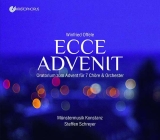 Winfried Offele: Ecce Advenit (Oratorium zum Advent für 7 Chöre & Orchester); Constanze Störk, Ivonne Fuchs, Thomas Volle, Clemens Morgenthaler, Kinder- & Jugendkantorei Konstanz, Vokalensemble Konstanz, Orchester Capella München, Steffen Schreyer; 2 CDs Christophorus CHR 77446; Aufahme 07/2019, Veröffentlichung 11/2020 (113') - Rezension von Remy Franck
Winfried Offele: Ecce Advenit (Oratorium zum Advent für 7 Chöre & Orchester); Constanze Störk, Ivonne Fuchs, Thomas Volle, Clemens Morgenthaler, Kinder- & Jugendkantorei Konstanz, Vokalensemble Konstanz, Orchester Capella München, Steffen Schreyer; 2 CDs Christophorus CHR 77446; Aufahme 07/2019, Veröffentlichung 11/2020 (113') - Rezension von Remy Franck
‘Ecce, advenit Dominator Dominus’ (Siehe, angekommen ist der Herrscher, der Herr), der liturgische Text des Introitus zum Fest Epiphanie hat der deutsche Komponist Winfried Offele (*1939) als Titel seines fast zweistündigen Oratoriums benutzt, indem er Texte zum Advent als Chorlieder, Arien und Ensembleszenen verarbeitet werden. Offele tut das in einem spätromantischen bis gemäßigt modernen Stil. Die Besetzung sieht rund 250 Musiker vor: Sieben Chöre und Vokalensembles, Solisten, Orchester und Orgel.
Das zweistündige Werk ist gewiss abwechslungsreich, wirkt aber auch, nicht zuletzt durch das stilistisch freie Denken des Komponisten, etwas zusammenhanglos, sieht man einmal vom kontinuierlichen Ausdruck des Glaubensbekenntnisses ab, das dieses religiöse Werk prägt. Vielleicht kommt das auch daher, dass das Ecce Advenit, wie Offele im Textheft schreibt, « aus Arbeiten vieler Jahrzehnte » zusammengewachsen ist und selbst nach der Uraufführung im Jahre 2010 immer noch ergänzt wurde.
Ich kann mir vorstellen, dass es in einer Live-Aufführung beeindruckt, aber es am Lautsprecher zu erleben, ist kein wirklich zufriedenstellendes Erlebnis. Man kann zwar Offeles Ideenreichtum nicht bestreiten, aber die Musik fließt eher an einem vorbei, als dass sie den Hörer ergreifen würde.
Als Dokument zeitgenössischer Suche nach einer neuen Form des großen Oratoriums hat dieses Ecce Advenit dennoch eine gewisse Bedeutung. Ob es im kirchlichen Rahmen eine Zukunft hat ist angesichts der Besetzung fraglich.
Ecce, advenit Dominator Dominus’ (Behold the Lord the Ruler is come), the liturgical text of the Introitus to the Feast of Epiphany, was used by the German composer Winfried Offele (*1939) as the title of his almost two-hour oratorio, in which texts for Advent are set as choral songs, arias and ensemble scenes. Offele does this in a late romantic to moderate modern style.
The cast consists of about 250 musicians: Seven choirs and vocal ensembles, soloists, orchestra and organ. The two-hour work is certainly varied and hold together by the continuous expression of faith, but nevertheless it seems somewhat incoherent, not least because of the composer’s stylistically free thinking. Perhaps this is also due to the fact that, as Offele writes in the text booklet, the Ecce Advenit has grown together « from works of many decades » and was still extended even after the premiere in 2010.
I can imagine that the work impresses in a live performance, but to experience it on a recording is not really a satisfying experience. You can’t deny Offele’s inventiveness, but the music flows past you rather than moving the listener.
As a document of the tedious search for a new form of grand oratorio, this Ecce Advenit nevertheless has a certain significance. Whether it has a future in the church context is questionable in view of the instrumentation.






















